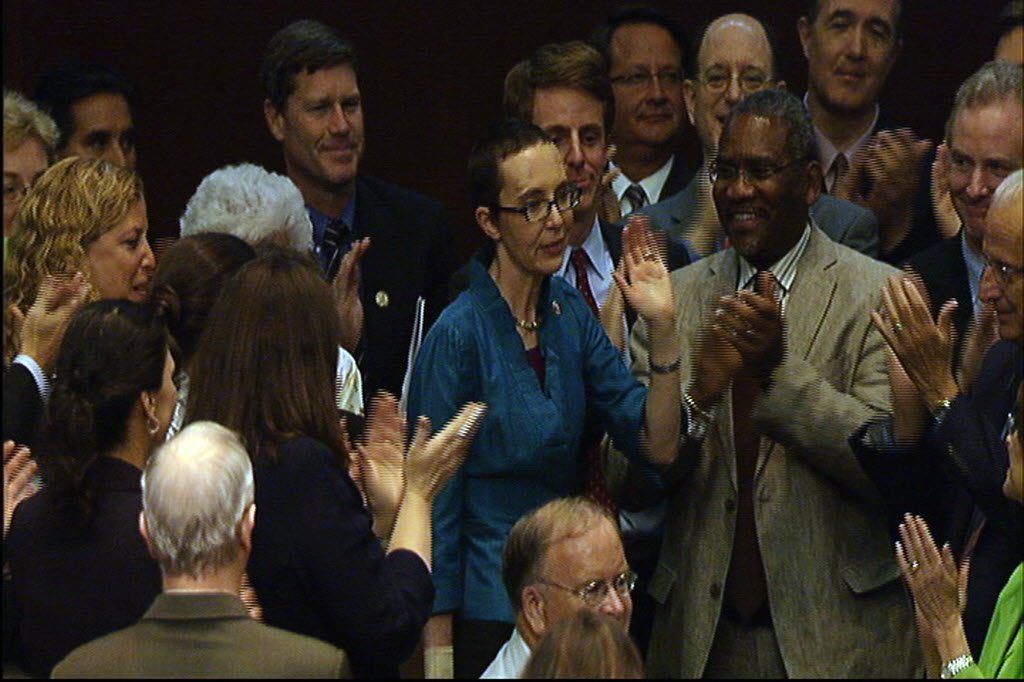WASHINGTON — Crisis legislation to yank the nation past the threat of a historic financial default sped through the House Monday night, breaking weeks of deadlock. The rare moment of cooperation turned celebratory when Rep. Gabrielle Giffords strode in for the first time since she was shot in the head nearly seven months ago.
The vote was 269-161, a scant day ahead of the deadline for action. But all eyes were on Giffords, who drew thunderous applause as she walked into the House chamber unannounced and cast her vote in favor of the bill.
A final Senate sign-off for the measure is virtually assured on Tuesday. Aside from raising the debt limit, the bill would slice federal spending by at least $2.1 trillion, and perhaps much more.
“If the bill were presented to the president, he would sign it,” the White House said, an understatement of enormous proportions.
After months of fierce struggle, the House’s top Republican and Democratic leaders swung behind the bill, ratifying a deal sealed Sunday night with a phone call from House Speaker John Boehner to President Barack Obama.
Many Republicans contended the bill still would cut too little from federal spending; many Democrats said much too much. Still, Republican lawmakers supported the compromise, 174-66, while Democrats split, 95-95.
“The legislation will solve this debt crisis and help get the American people back to work,” Boehner said at a news conference a few hours before the vote.
The Democratic leader, Rep. Nancy Pelosi, was far less effusive. “I’m not happy with it, but I’m proud of some of the accomplishments in it. That’s why I’m voting for it.”
So, too, many of the first-term Republicans whose election in 2010 handed the GOP control of the House and set the federal government on a new, more conservative course.
“It’s about time that Congress come together and figure out a way to live within our means,” said one of them, Sean Duffy of Wisconsin. “This bill is going to start that process although it doesn’t go far enough.”
Get past elections
The measure would cut federal spending by at least $2.1 trillion over a decade — and possibly considerably more — and would not require tax increases. The U.S. debt limit would rise by at least $2.1 trillion, tiding the Treasury over through the 2012 elections.
Without legislation in place by the end of Tuesday, the Treasury would run out of cash needed to pay all its bills. Administration officials say a default would ensue that would severely damage the economy.
Beyond merely avoiding disaster, Obama and congressional leaders hoped their extraordinary accord would reassure investors at home and around the world, preserve the United States’ Aaa credit rating and begin to slow the growth in America’s soaring debt. In a roller-coaster day on Wall Street, the Dow Jones industrial average surged, then sank and finally finished down for a seventh straight session, but only slightly.
After months of suspense, Monday night’s vote was anti-climactic,
Not so the moment when Giffords’ presence became known.
She greeted some fellow lawmakers who crowded around her and blew kisses to others, beaming the whole while. Her hair was dark and close cropped and she wore glasses — nothing like the image America had of her six months ago when she was shot while greeting constituents outside a supermarket in Tucson.
She did not speak with reporters.
As for the legislation, after months of wrangling over a deal, there was little time left for lawmakers to decide how to vote.
The White House dispatched Vice President Joe Biden to the Capitol to lobby recalcitrant Democrats in both houses.
“They expressed all their frustration,” he conceded after a session with lawmakers of his party in the House.
He said the deal “has one overwhelming redeeming feature” — postponing the next debt limit battle until 2013 and putting the current fight behind. “We have to get this out of the way to get to the issue of growing the economy,” he said.
Republicans lobbied their rank and file as well, and the results were far more positive for them than a week ago when they were forced to delay a vote on an earlier measure.



